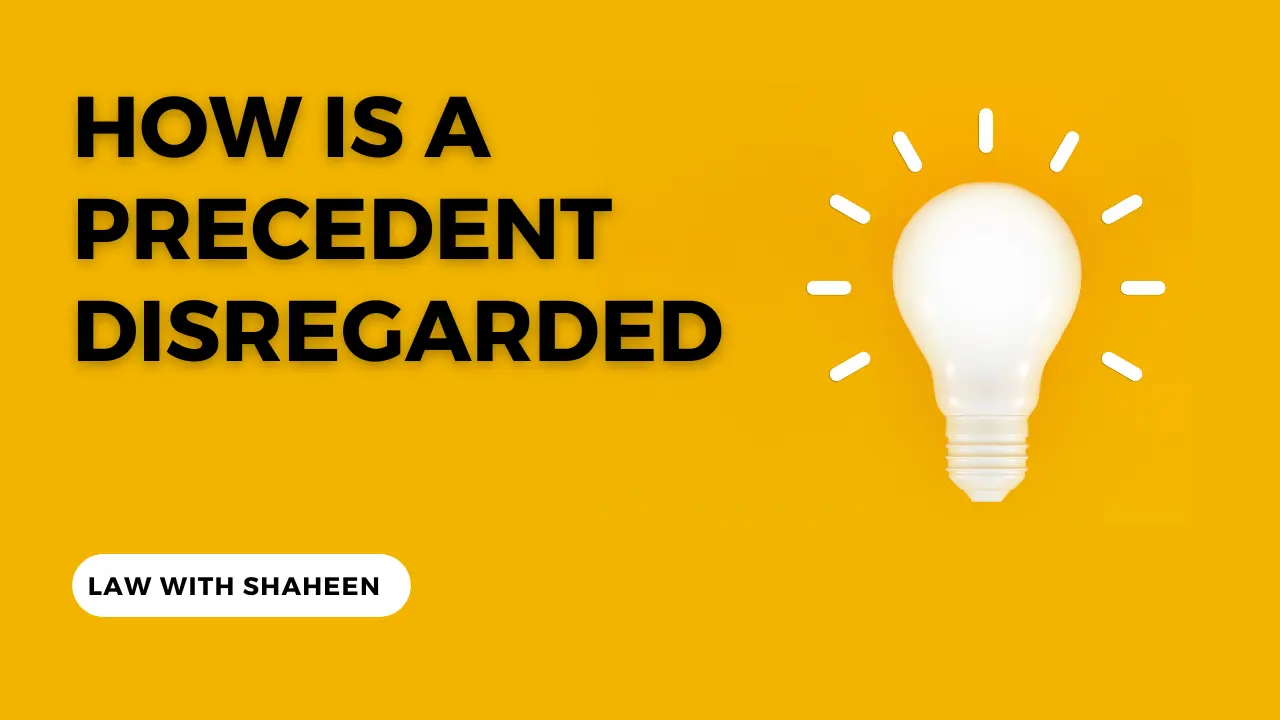Table of Contents
How is a Precedent disregarded?
A precedent may be disregarded in any one of the following two ways:
1). It may be overruled by a court of superior jurisdiction. In such an eventuality the precedent loses all its force with retrospective effect so that transactions entered into before the date of overruling shall be affected as much as the transaction entered into after that ruling.
2). A court of concurrent jurisdiction may refuse to follow it. In such a case the precedent retains its position but remains in conflict with the new decisions.
Elements of Gaining Weight to Precedents:
The circumstances which tend to increase the authority of a precedent are as follows: –
- The unanimity of the Court giving the decision.
- Affirmation or approval of that decision by other courts. It will gain added authority if it’s affirmed by a superior court.
- The eminence of the Judge giving the decision.
- Absence of criticism by the profession.
- The learned argument, consultation of the Judges or other great deliberations.
- The fact of an Act being passed on the same subject matter without reversing the decision.
Elements that Decrease the Value of Precedents:
These may be summed up as follows: –
- Lack of unanimity among the Judges.
- Failure to notice a contrary decision.
- Being misled by reliance on a case of no authority.
- Absence of final judgment.
- Decision-based on compromise.
- The decision is passed ex parte.
- Judgement in the absence of argument at the Bar or by the court.
- The decision was given in haste—the question was not fully argued (such as those given in summary proceedings).
- Case being badly reported.
- Agreement of the Judges in the result but not in the reasoning.
- The decision was reached in order to avoid some special hardship.
- The decision has been doubted or criticized.
- The result is embarrassing or unjust.
Advantages of Legislation over Precedent:
Legislation as a source of law has many advantages over precedent
Legislation as a Source of Law:
i). The legislation is both constitutive and abrogative, but the precedent is merely constitutive. The legislation is not only a source of law but also the most effective instrument for abolishing the existing law. Abrogative power is important for legal reform and this virtue is not possessed by precedent which may produce new but cannot reverse that which is already a law. The legislation is a necessary instrument not only for the growth of law but also for its reform.
ii). The legislation is based on the principle of division of labour and consequently enjoys the advantage of efficiency. The legislation and judicial functions are separated and consequently, both of them are done better by different organs. Legislature attends to the work of legislation and the judiciary attends to the work of interpreting and applying the law.
iii). The legislation satisfies the requirement of natural justice that laws shall be known before they are enforced. Law is declared within the sort of legislation and therefore the same is afterwards enforced by the courts. Law is formally declared to the people and if after that they dare to violate the same, they are punished.
However, that is not the case with precedents. It is created and declared in the very act of applying and enforcing it. There is no formal declaration of precedent. It is applied as soon as it is made.
iv). The legislation makes rules for cases that have not yet arisen but precedent must wait until the actual and concrete incident comes before the courts for a decision.
Precedent depends on the accidental course of litigation but legislation is independent of it. A precedent must wait till such time as a case is brought for decision before a court of law. Legislation can move at once to fill up the vacancy or settle doubt in the legal system.
v). The legislation is superior in the form of precedent. It is brief, clear, easily accessible and knowable. Case law is buried from sight and knowledge in the huge and daily growing mass of the records of litigation.
Advantages of Precedent Over Legislation:
i). Precedent also has certain advantages over legislation. According to Dicey: “The morality of the courts is higher than the morality of the politician”. Politicians are always swayed by popular passions and are susceptible to making bad laws. O
n the other hand, Judges decide cases in a calm atmosphere and can afford to hold the scales even between the contending parties. They perform their functions impartially and fearlessly.
ii). According to Salmond, case law enjoys greater flexibility than statute law. Statute law suffers from the defect of rigidity. Courts are bound by the letter of law and are not allowed to ignore an equivalent.
In the case of precedent, the analogical extension is allowed. Legislation as an instrument of reform is indeed important but it can’t be denied that precedent has its own importance as a constitutive element in the making of law although it cannot abrogate the law.
To conclude that in the present age, both legislation and precedent are equally important and one cannot attain its end without the other. The aim of the law is the protection and progress of society and the individual. For planned progress legislation is necessary. To interpret it and to apply and adapt it to a particular case, case law is equally necessary. Both legislation and precedents contribute equally to the development of law.
